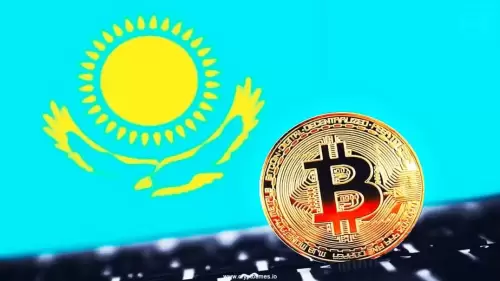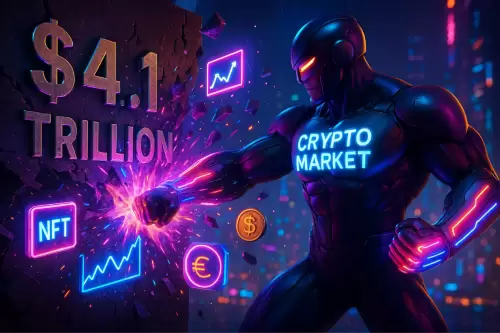 |
|
 |
|
 |
|
 |
|
 |
|
 |
|
 |
|
 |
|
 |
|
 |
|
 |
|
 |
|
 |
|
 |
|
 |
|
Cryptocurrency News Articles
Bitcoin Solaris Overcomes Gossip Protocol's Limitations with Deterministic State Channels
May 16, 2025 at 09:00 pm
Bitcoin Solaris made headlines with its "gossip about gossip" protocol — a system where nodes randomly share information with peers, propagating consensus through virtual voting.

Hedera Hashgraph's "gossip about gossip" protocol, where nodes randomly share information with peers to form consensus through virtual voting, has been a subject of interest. While this model reduced bandwidth compared to legacy blockchains, it faced limitations such as delayed state resolution, high validator dependency, and opaque ordering in high-volume environments.
Bitcoin Solaris, on the other hand, introduces a state channel framework that provides deterministic off-chain consensus with near-instant finality, overcoming these constraints. The framework enables participants to interact off-chain, with transactions being committed back to the base layer for finalization. This integration reduces network load and offers a scalable architecture suitable for demanding tech applications.
State channels are bi-directional communication lanes where users or nodes can exchange transactions off-chain, performing operations and updating a shared state. In Bitcoin Solaris, these channels are implemented across its Solaris Layer, enabling users to execute hundreds or even thousands of off-chain updates before settling the final state on-chain with a single transaction.
Unlike Hedera's probabilistic ordering system, which relies on redundant gossiping and later confirmation to resolve message order, Bitcoin Solaris uses cryptographic time-locks, Merkle-root commitments, and validator checkpoints for exact sequencing and provable finality. This approach eliminates inconsistencies caused by asynchronous messaging and supports rapid, tamper-proof processing.
The separation of consensus logic from execution allows Bitcoin Solaris to support large-scale operations with extremely low latency, a critical factor for advanced tech solutions requiring real-time trust guarantees.
Bitcoin Solaris integrates its state channel system into a dual-layer architecture, combining the Bitcoin base chain with the parallel Solaris Layer. This setup allows off-chain sessions to open and close securely without constant network-wide broadcast, avoiding the gossip model's bandwidth redundancy while preserving strong Byzantine Fault Tolerance (BFT). Each state update in Solaris is locally verified, Merkle-anchored, and finalized in 2 seconds or less.
In a recent analysis by Crypto Volt, Hedera's gossip protocol is compared with Bitcoin Solaris's state channels, highlighting the advantages of deterministic updates over gossip-based propagation. The video explains how state channels provide a more efficient and scalable solution for blockchain technology.
To ensure the state channels offer optimum security and tamper-resistance, Bitcoin Solaris has undergone full protocol audits by leading blockchain firms, confirming that its off-chain communication structure meets enterprise-grade standards.
Bitcoin Solaris is currently in Presale Phase 3, with BTC-S tokens priced at 3 USDT and provides early access to the channel-optimized protocol and the expanding validator ecosystem.
Out of the 21 million BTC-S capped supply, 4.2 million tokens (20%) are allocated for presale across all phases. The tokens are designed to be consumed in the network and are not designed for inflationary practices. Future token issuance is strictly tied to mobile mining rewards and validator participation.
Presale participants gain benefits such as early infrastructure access, first rights to open channels, and priority exposure as off-chain ecosystems expand.
While Hedera's gossip model brought improvements over traditional broadcasting, Bitcoin Solaris aims to offer a more advanced solution with deterministic, verifiable state channels that provide faster settlement and stronger guarantees.
The combination of a dual-layer architecture, high-throughput consensus, and audit-verified design in Bitcoin Solaris provides a secure foundation for large-scale, real-time off-chain operations and the most demanding advanced tech applications.
As Phase 3 continues and channel applications come online, it establishes a new benchmark for scalable communication in decentralized networks.
Website: https://bitcoinsolaris.com/
X: https://x.com/BitcoinSolaris
Telegram: https://t.me/Bitcoinsolaris
Disclaimer:info@kdj.com
The information provided is not trading advice. kdj.com does not assume any responsibility for any investments made based on the information provided in this article. Cryptocurrencies are highly volatile and it is highly recommended that you invest with caution after thorough research!
If you believe that the content used on this website infringes your copyright, please contact us immediately (info@kdj.com) and we will delete it promptly.






























































